- Home
- Deborah Harkness
Shadow of Night: A Novel Page 11
Shadow of Night: A Novel Read online
Page 11
“You must go to Sept-Tours. He won’t rest until he claims your body for burial or you are standing before him, alive. Philippe doesn’t trust Elizabeth—or the Congregation.” Gallowglass intended his words to bring comfort this time, but Matthew’s air of remove remained.
Gallowglass made an exasperated sound. “Deceive the others—and yourself, if you must. Discuss alternatives all night if you wish. But Auntie’s right: It’s all shite.” Gallowglass’s voice dropped. “Your Diana doesn’t smell right. And you smell older than you did last week. I know the secret you’re both keeping. He’ll know it, too.”
Gallowglass had deduced that I was a timewalker. One look at Hancock told me that he had, too.
“Enough!” Walter barked.
Gallowglass and Hancock quieted immediately. The reason blinked on Walter’s little finger: a signet bearing the outlines of Lazarus and his coffin.
“So you’re a knight, too,” I said, stunned.
“Yes,” said Walter tersely.
“And you outrank Hancock. What about Gallowglass?” There were too many overlapping layers of loyalty and allegiance in the room. I was desperate to organize them into a navigable structure.
“I outrank everyone in this room, madam, with the exception of your husband,” Raleigh cautioned. “And that includes you.”
“You have no authority over me,” I shot back. “Exactly what is your role in the de Clermont family’s business, Walter?”
Over my head, Raleigh’s angry blue eyes met Matthew’s. “Is she always like this?”
“Usually,” Matthew said drily. “It takes some getting used to, but I rather like it. You might, too, given time.”
“I already have one demanding woman in my life. I don’t need another,” Walter snorted. “If you must know, I command the brotherhood in England, Mistress Roydon. Matthew cannot do so, given his position on the Congregation. The other members of the family were otherwise occupied. Or they refused.” Walter’s eyes flickered to Gallowglass.
“So you’re one of the order’s eight provincial masters and report directly to Philippe,” I said thoughtfully. “I’m surprised you’re not the ninth knight.” The ninth knight was a mysterious figure in the order, his identity kept secret from all except those at the very highest levels.
Raleigh swore so vehemently that Pierre gasped. “You keep the fact that you’re a spy and a member of the Congregation from your wife, yet you tell her the most private business of the brotherhood?”
“She asked,” Matthew said simply. “But I think that’s enough talk of the Order of Lazarus for tonight.”
“Your wife won’t be satisfied leaving it there. She will worry at this like a hound with a bone.” Raleigh crossed his arms over his chest and scowled. “Very well. If you must know, Henry is the ninth knight. His unwillingness to embrace the Protestant faith makes him vulnerable to allegations of treason here in England, and in Europe he is an easy target for every malcontent who would like to see Her Majesty lose her throne. Philippe offered him the position to shield him from those who would abuse his trusting nature.”
“Henry? A rebel?” I looked at the gentle giant, stunned.
“I’m no rebel,” Henry said tightly. “But Philippe de Clermont’s protection has saved my life on more than one occasion.”
“The Earl of Northumberland is a powerful man, Diana,” Matthew said quietly, “which makes him a valuable pawn in the hands of an unscrupulous player.”
Gallowglass coughed. “Can we leave off talk of the brotherhood and return to more urgent matters? The Congregation will call on Matthew to calm the situation in Berwick. The queen will want him to stir it up further, because so long as the Scots are preoccupied with witches, they won’t be able to plan any mischief in England. Matthew’s new wife is facing witchcraft accusations at home. And his father has recalled him to France.”
“Christ,” Matthew said, pinching the bridge of his nose. “What a tangled mess.”
“How do you propose we untangle it?” Walter demanded. “You say Philippe cannot come here, Gallowglass, but I fear that Matthew ought not go there either.”
“No one ever said that having three masters—and a wife—was going to be easy,” Hancock declared sourly.
“So which devil will it be, Matthew?” asked Gallowglass.
“If Philippe doesn’t receive the coin embedded in the letter’s seal from my own hand, and soon, he’ll come looking for me,” Matthew said hollowly. “It’s a test of loyalty. My father loves tests.”
“Your father does not doubt you. This misunderstanding will be set to rights when you see each other,” Henry maintained. When Matthew didn’t respond, Henry moved to fill the silence. “You are always telling me that I must have a plan, or else be pulled into the designs of other men. Tell us what must be done, and we will see to it.”
Without speaking, Matthew picked through options, discarding one after the other. It would have taken any other man days to sift through the possible moves and countermoves. For Matthew it took only minutes. There was little sign of the struggle on his face, but the bunching of his shoulder muscles and the distracted pass of his hand through his hair told another story.
“I’ll go,” he said at last. “Diana will stay here, with Gallowglass and Hancock. Walter will have to put off the queen with some excuse. And I’ll handle the Congregation.”
“Diana can’t remain in Woodstock,” Gallowglass told him firmly. “Not now that Kit’s been at work in the village, spreading his lies and asking questions about her. Without your presence neither the queen nor the Congregation will have any incentive to keep your wife from the magistrate.”
“We can go to London, Matthew,” I urged. “Together. It’s a big city. There will be too many witches for anyone to notice me—witches who aren’t afraid of power like mine—and messengers to take word to France that you’re safe. You don’t have to go.” You don’t have to see your father again.
“London!” Hancock scoffed. “You wouldn’t last three days there, madam. Gallowglass and I will take you into Wales. We’ll go to Abergavenny.”
“No.” My eyes were drawn by the crimson stain at Matthew’s neck. “If Matthew is going to France, I’m going with him.”
“Absolutely not. I’m not dragging you through a war.”
“The war has quieted with the coming of winter,” said Walter. “Taking Diana to Sept-Tours may be for the best. Few are brave enough to tangle with you, Matthew. None at all will cross your father.”
“You have a choice,” I told him fiercely. Matthew’s friends and family weren’t going to use me to force him to France.
“Yes. And I choose you.” He traced my lip with his thumb. My heart sank. He was going to go to Sept-Tours.
“Don’t do this,” I implored him. I didn’t trust myself to say more for fear of betraying the fact that in our own time Philippe was dead, and that it would be torture for Matthew to see him alive again.
“Philippe told me that mating was destiny. Once I found you, there would be nothing to do but accept fate’s decision. But that’s not how it works at all. In every moment, for the rest of my life, I will be choosing you—over my father, over my own self-interest, even over the de Clermont family.” Matthew’s lips pressed against mine, silencing my protests. There was no mistaking the conviction in his kiss.
“It’s decided, then,” Gallowglass said softly.
Matthew’s eyes held mine. He nodded. “Yes. Diana and I will go home. Together.”
“There’s work to do, arrangements to be made,” Walter said. “Leave it to us. Your wife looks exhausted, and the journey will be taxing. You both should rest.”
Neither of us made any move toward bed once the men had gone off to the parlor.
“Our time in 1590 isn’t turning out quite as I hoped,” Matthew admitted. “It was supposed to be straightforward.”
“How could it possibly be straightforward, with the Congregation, the trials in Berwick, the Elizabethan
intelligence service, and the Knights of Lazarus all vying for your attention?”
“Being a member of the Congregation and serving as a spy should be helps—not hindrances.” Matthew stared out the window. “I thought we’d come to the Old Lodge, use the services of Widow Beaton, find the manuscript in Oxford, and be gone within a few weeks.”
I bit my lip to keep from pointing out the flaws in his strategy—Walter, Henry, and Gallowglass had already done so repeatedly this evening—but my expression gave me away.
“It was shortsighted of me,” he said with a sigh. “And it’s not just establishing your credibility that’s a problem, or avoiding the obvious traps like witch trials and wars. I’m overwhelmed, too. The broad canvas of what I did for Elizabeth and the Congregation—and the countermoves I made on behalf of my father—that’s clear, but all the details have faded. I know the date, but not the day of the week. That means I’m not sure which messenger is due to arrive and when the next delivery will be made. I could have sworn I’d parted ways with Gallowglass and Hancock before Halloween.”
“The devil is always in the details,” I murmured. I brushed at the sooty track of dried blood that marked the passage of his tear. There were specks of it near the corner of his eye, a thin trace down his cheek. “I should have realized your father might contact you.”
“It was only a matter of time before his letter came. Whenever Pierre brings the mail, I steel myself. But the courier had already been and gone today. His handwriting took me by surprise, that’s all,” he explained. “I’d forgotten how strong it once was. When we got him back from the Nazis in 1944, his body was so broken that not even vampire blood could mend it. Philippe couldn’t hold a pen. He loved to write, and all he could manage was an illegible scrawl.” I knew of Philippe’s capture and captivity in World War II, but few details of what he’d suffered at the hands of the Nazis who had wanted to determine how much pain a vampire could endure.
“Maybe the goddess wanted us back in 1590 for more than just my benefit. Seeing Philippe again may reopen these old wounds of yours—and heal them.”
“Not before making them worse.” Matthew’s head dipped.
“But in the end it might make them better.” I smoothed his hair over his hard, stubborn skull. “You still haven’t opened your father’s letter.”
“I know what it says.”
“Perhaps you should open it anyway.”
At last Matthew slid his finger under the seal and broke it. The coin tumbled out of the wax, and he caught it in his palm. When he unfolded the thick paper, it released a faint scent of laurel and rosemary.
“Is that Greek?” I asked, looking over his shoulder at the single line of text and a swirling rendition of the letter phi below.
“Yes.” Matthew traced the letters, making his first tentative contact with his father. “He commands me to come home. Immediately.”
“Can you bear seeing him again?”
“No. Yes.” Matthew’s fingers crumpled the page into his fist. “I don’t know.”
I took the page away from him, flattening it back into its rectangle. The coin sparkled in Matthew’s palm. It was such a small sliver of metal to have caused so much trouble.
“You won’t face him alone.” Standing by his side when he saw his dead father wasn’t much, but it was all I could do to ease his grief.
“Each of us is alone with Philippe. Some think my father can see into one’s very soul,” Matthew murmured. “It worries me to take you there. With Ysabeau I could predict how she would react: coldness, anger, then acquiescence. When it comes to Philippe, I have no idea. No one understands the way Philippe’s mind works, what information he possesses, what traps he’s laid. If I am secretive, then my father is inscrutable. Not even the Congregation knows what he’s up to, and God knows they spend enough time trying to figure it out.”
“It will be fine,” I reassured him. Philippe would have to accept me into the family. Like Matthew’s mother and brother, he would have no choice.
“Don’t think you can best him,” Matthew warned. “You may be like my mother, as Gallowglass said, but even she gets caught in his web from time to time.”
“And are you still a member of the Congregation in the present? Is that how you knew that Knox and Domenico were members?” The witch Peter Knox had been stalking me since the moment I called up Ashmole 782 at the Bodleian. As for Domenico Michele, he was a vampire with old animosities when it came to the de Clermonts. He’d been present at La Pierre before yet another member of the Congregation tortured me.
“No,” Matthew said shortly, turning away.
“So what Hancock said about a de Clermont always being on the Congregation is no longer true?” I held my breath. Say yes, I urged him silently, even if it’s a lie.
“It’s still true,” he said evenly, crushing my hope.
“Then who . . . ?” I trailed off. “Ysabeau? Baldwin? Surely not Marcus!” I couldn’t believe that Matthew’s mother, his brother, or his son could be involved without someone letting it slip.
“There are creatures on my family tree that you don’t know, Diana. In any case, I’m not free to divulge the identity of the one who sits at the Congregation’s table.”
“Do any of the rules that bind the rest of us apply to your family?” I wondered. “You meddle in politics—I’ve seen the account books that prove it. Are you hoping that when we return to the present, this mysterious family member is going to somehow shield us from the Congregation’s wrath?”
“I don’t know,” Matthew said tightly. “I’m not sure of anything. Not anymore.”
***
Our plans for departure took shape quickly. Walter and Gallowglass argued about the best route, while Matthew set his affairs in order.
Hancock was dispatched to London with Henry and a leather-wrapped packet of correspondence. As a peer of the realm, the earl was required at court for the celebrations of the queen’s anniversary on the seventeenth of November. George and Tom were packed off to Oxford with a substantial sum of money and a disgraced Marlowe. Hancock warned them of the dire consequences that would ensue if the daemon caused any more trouble. Matthew might be far away, but Hancock would be within sword’s reach and would not hesitate to strike if it was warranted. In addition, Matthew instructed George on exactly what questions about alchemical manuscripts he could ask the scholars of Oxford.
My own affairs were far simpler to arrange. I had few personal items to pack: Ysabeau’s earrings, my new shoes, a few items of clothing. Françoise turned all her attention to making me a sturdy, cinnamon-colored gown for the journey. Its high, fur-lined collar was designed to fasten closely and keep out the winds and rain. The silky fox pelts that Françoise stitched into the lining of my cloak would serve the same purpose, as would the bands of fur she inserted into the embroidered edges of my new gloves.
My last act at the Old Lodge was to take the book Matthew had given me to the library. It would be easy to lose such an item on the way to Sept-Tours, and I wanted my diary to be as safe from prying eyes as possible. I stooped to the rushes and picked up sprigs of rosemary and lavender. Then I went to Matthew’s desk and selected a quill and a pot of ink and made one final entry.
5 November 1590 cold rain
News from home. We are preparing for a journey.
After blowing gently on the words to set the ink, I slipped the rosemary and lavender into the crevice between the pages. My aunt used rosemary for memory spells and lavender to breathe a note of caution into love charms—a fitting combination for our present circumstances.
“Wish us luck, Sarah,” I whispered as I slid the small volume into the end of the shelf, in hopes that it would still be there should I return.
7
Rima Jaén hated the month of November. The hours of daylight shrank, giving up their battle against the shadows a few moments earlier with each passing day. And it was a terrible time to be in Seville, with the whole city gearing up for the holiday s
eason and rain just around the corner. The normally erratic driving habits of the city’s residents grew worse by the hour.
Rima had been stuck at her desk for weeks. Her boss had decided to clear out the storage rooms in the attic. Last winter the rain had made it through the ancient, cracked roof tiles on top of the decrepit house, and the forecast for the coming months was even worse. There was no money to fix the problem, so the maintenance staff was hauling moldy cardboard boxes down the stairs to make sure that nothing of value was damaged in future storms. Everything else was discreetly gotten rid of in such a way that no potential donors could discover what was afoot.
It was a dirty, deceitful business, but it had to be done, Rima reflected. The library was a small, specialist archive with scant resources. The core of its collections came from a prominent Andalusian family whose members could trace their roots back to the reconquista, when the Christians had taken back the peninsula from the Muslim warriors who had claimed it in the eighth century. Few scholars had reason to poke through the bizarre range of books and objects the Gonçalves had collected over the years. Most researchers were down the street at the Archivo General de Indias, arguing about Columbus. Her fellow Sevillanos wanted their libraries to have the latest thriller, not crumbling Jesuit instruction manuals from the 1700s and women’s fashion magazines from the 1800s.
Rima picked up the small volume sitting on the corner of her desk and swung a pair of brightly colored glasses down from the top of her head, where they were holding back her black hair. She’d noticed the book a week ago, when one of the maintenance workers had dropped a wooden crate before her with a grunt of displeasure. Since then she’d entered it into the collection as Gonçalve Manuscript 4890 along with the description “English commonplace book, anonymous, late 16th century.” Like most commonplace books, it was mostly blank. Rima had seen one Spanish example owned by a Gonçalve heir sent to the University of Seville in 1628. It had been finely bound, ruled, and paginated with ornate numbers set in swirls of multicolored ink. There was not a single word in it. Even in the past, people never quite lived up to their aspirations.

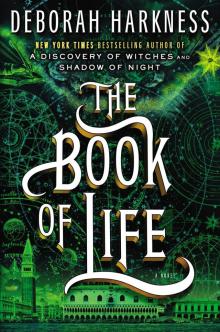 The Book of Life
The Book of Life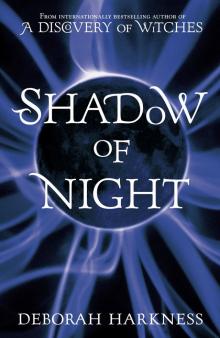 Shadow of Night
Shadow of Night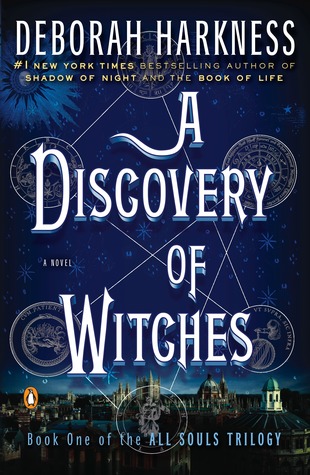 A Discovery of Witches
A Discovery of Witches The All Souls Real-Time Reading Companion
The All Souls Real-Time Reading Companion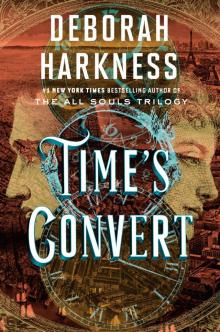 Time's Convert
Time's Convert The World of All Souls
The World of All Souls A Discovery of Witches: A Novel (All Souls Trilogy)
A Discovery of Witches: A Novel (All Souls Trilogy)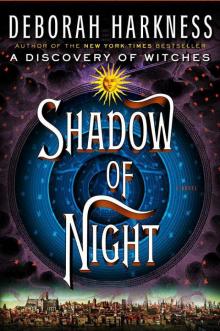 Shadow of Night: A Novel
Shadow of Night: A Novel